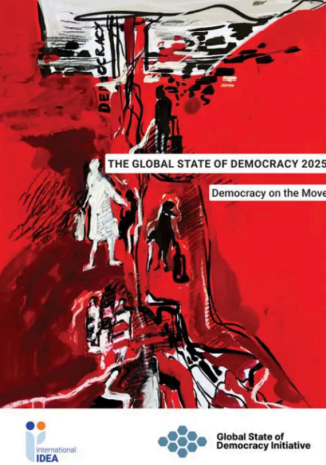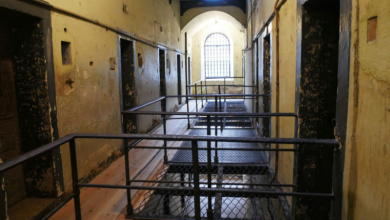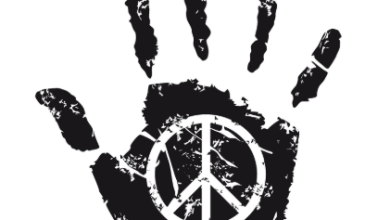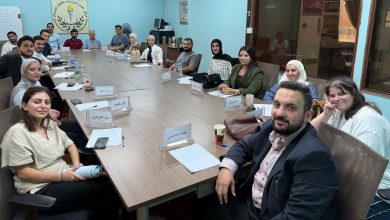SUMMARY GLOBAL STATE OF DEMOCRACY 2025 REPORT: ARAB COUNTRIES

SUMMARY GLOBAL STATE OF DEMOCRACY 2025
REPORT: ARAB COUNTRIES AMMAN CENTER FOR HUMAN RIGHTS STUDIES INTRODUCTION
On the 11th of September, ACHRS interns Julia and Alexia remotely attended the launch of the Global State of Democracy 2025 report by International IDEA. During the launch, the speakers highlighted that for the 9th consecutive year, more countries declined regarding democracy than improved. There was an especially steep decline in the rule of law in Europe, while participation scores remained relatively constant, and there were even more gains in absence of corruption than declines.
Ms Cecilia Jimenez-Damary, international human rights lawyer and Former United Nations Human Rights Council Special Rapporteur on the human rights of internally displaced persons, stressed that democracy is a work in progress, and that it needs a people’s approach and solidarity, rather than being a technical bureaucratic endeavor.
After attending the launch, Julia and Alexia studied the report, writing a summary of the most important findings for the Maghreb (Alexia) and the Mashreq (Julia) region.
The report looks at changes in the performance in the state of democracy over the last 5 years, comparing 2019 and 2024. It found that in general in Africa and West Asia, and thus also including (most of the) the Arab States, there was a decline in the state of democracy. Specifically, the category ‘representation’ scores weakly and further declined in both Africa and West Asia. The most notable advances were made in both Africa and West Asia in absence of corruption and personal integrity and security. Let us now zoom in and look at the performance of the Arab countries individually.
COUNTRY SUMMARIES
1. Algeria
In Algeria, democratic standards have continued to decline. Representation remains weak (score 0.374; rank 117/173), and although participation (0.437; rank 129) and certain rights indicators (0.436; rank 104) are holding at a mid-level, the overall state of the rule of law has worsened (0.360; rank 120). Since 2019, Algeria’s performance has been relatively stable overall, but civil liberties and personal integrity & security have declined noticeably. Over the past year, authorities have tightened control over civil society and independent media, with opposition groups and peaceful dissent facing increasing legal and political pressure. The public space for political engagement is shrinking, making meaningful democratic reform unlikely in the near term.
2. Bahrain
Bahrain’s score has been relatively stable over the past 5 years, but generally scores low on the index for representation, rights, rule of law and participation. While it is found to have inclusive suffrage, it scores low, and generally lower than the regional average, for credible elections, effective parliament, free political parties, local democracy, civil society and electoral participation. IDEA mentions that the rulers of Bahrain do not seem willing to allow independent political parties, thus signalling that the weak performance with regards to democracy will likely not improve anytime soon.
3. Comoros
In Comoros, democratic performance remains weak: the country scores in the low range for Representation, Rights and Rule of Law and mid-level for Participation, with global rankings of Representation 120/173; Rights 146/173; Rule of Law 137/173; Participation 104/173. Over the past five years IDEA flags declines in Access to Justice and Freedom of the Press, and low voter turnout and constrained media space have been features of recent elections (January 2024 presidential/gubernatorial polls). Overall, the outlook is fragile: limited institutional capacity, persistent poverty and periodic repression mean meaningful strengthening of democratic standards is unlikely without political opening and rule-of-law reform.
4. Djibouti
Djibouti performs in the low range across all four GSoD categories, with rankings recorded at Representation 130/173; Rights 123/173; Rule of Law 127/173; Participation 142/173. IDEA describes a dominant-party, highly personalised system under President Ismaïl Omar Guelleh (long incumbency), frequent opposition boycotts of elections, limits on political competition, and constrained civic space. Corruption, inequality and the geopolitical role of foreign military bases shape a stable but repressive political equilibrium; therefore short-term democratic progress is unlikely unless there are credible efforts to open political competition and strengthen independent institutions.
5. Egypt
Egypt’s score has remained relatively stable, with some small recent improvements regarding representation and rule of law. Nevertheless, the country scores low to mid-range on most democracy indicators. Specifically freedom of political parties, local democracies, civil liberties, personal integrity and security, and civil and engagement and civil society score low in general and compared to the regional average. On the other hand, the country scores relatively well in inclusive suffrage and electoral participation. While personal integrity and security is still low, it has improved in comparison to 2019. More recent developments, namely the arrest and deportation of Sudanese refugees, as well as the government crackdown on protests in solidarity with Gaza, spark serious worries about human rights, including the right to protest/speak/ and the right to refuge.
6. Iraq
Iraq has since 2019 seen slight increases in its score for participation and rule of law. For representation and participation, it scores mid-range, though far above the average of the region. It scores low for rights such as access to justice and political equality, as well as rule of law. In the last 5 years, personal integrity and security, as well as absence of corruption have significantly improved. In November 2025 Iraq will hold parliamentary elections, thus it will serve as an important moment to measure the actual quality of democracy in Iraq.
7. Jordan
Jordan generally scores mid-range with regards to the democracy indicators. Nevertheless, since 2019 there have been changes in the country, with participation decreasing, as representation improves. The country generally scores better than the regional average, but scores particularly low on local democracy and electoral participation. There were notable improvements in economic equality and effective parliament, the latter of which is a positive outcome of the 2024 legislative elections. However, in May 2025 the Muslim Brotherhood was banned, and in July an elected parliamentarian, Yanal Frehat, was temporarily detained and is still facing prosecution, sparking worries about the freedom of political parties and civil society. Meanwhile, Jordan is seeing more suppression of dissent and protests, thus showing negative signs for the state of democracy.
8. Kuwait
Kuwait has suffered from an immense setback in its representation in 2024, as the parliament was dissolved, and parts of the constitution were suspended for potentially four years. Relatedly, the state’s performance in participation and rights have also worsened. At the moment, the country still performs mid-range with regards to rights and rule of law, but representation is extremely low. Another ongoing limitation of the right to participate is the fact that about 2/3s of the population of Kuwait is made up of immigrants or naturalised citizens, who are not allowed to run for parliament and can only vote 20 years following obtainment of citizenship.
9. Lebanon
Between 2019 and 2024, Lebanon has witnessed some negative trends in all four indicators. For representation, rights, and participation, the country performs mid-range, and also better than the regional average. Rule of law, however, gets accorded a very low score. Zooming in on some of the indicators, the effectiveness of parliament, the access to justice, basic welfare, absence of corruption, and personal integrity and security are found to be deteriorating in Lebanon. The country faces severe problems, as its institutions are very weak, which was highlighted by the Beirut 2020 port explosion. More recently, the Israeli invasion and bombing campaign in Lebanon have had serious negative consequences for the country. Nevertheless, 2025 so far seems to be promising for Lebanon’s state of democracy, as a new president was elected, a seemingly pro-active government was established, municipal elections were organised, and a law that aims to improve the independence of the judiciary was approved.
10. Libya
Libya, still mired in conflict and political fragmentation, remains at the bottom of most democratic rankings. In 2024, its Representation score is 0.245 (rank 151), Rights is 0.092 (rank 155), Rule of Law is 0.432 (rank 170), and its Participation rank is 131 (score very low) under IDEA. The country has not held national elections for years, and rival governments continue to divide power between the east and west. Rule of law is virtually non-existent in many areas, and human rights violations—including against migrants, civil society actors, and journalists—are widespread. With no unified authority and ongoing security challenges, prospects for democratic development are extremely limited.
11. Mauritania
Mauritania shows slightly more promise, but still faces significant structural challenges. In 2024, its Representation score is 0.391 (rank 114), Rights is 0.231 (rank 158), Rule of Law is 0.308 (rank 134), and Participation is 0.451 (rank 123) according to IDEA. It performs particularly poorly on Rights and Rule of Law, while Participation is somewhat stronger though still modest. While recent elections have been relatively peaceful and competitive, concerns remain around media freedom, judicial independence, and discrimination, particularly against marginalized communities. Legal and institutional reforms have been slow and uneven, and overall, the country remains in a fragile democratic position with limited momentum for deeper change.
12. Morocco
Morocco presents a mixed picture. In 2024, its Representation score is 0.432 (ranked 107), Rights is 0.509 (ranked 77), Rule of Law is 0.396 (ranked 103), and Participation is 0.531 (ranked 96) under IDEA’s GSoD framework. Mid-range performance in Rights, Representation, and Participation is evident, while the Rule of Law remains weak. Weaknesses in representation and rule of law continue to hold it back. Some progress has been made, particularly in electoral participation and institutional performance, but these gains are undermined by restrictive laws affecting labor rights, freedom of assembly, and press freedom. Overall, Morocco has avoided dramatic democratic backsliding, but remains stuck in a pattern of cautious reform that falls short of broader democratization.
13. Oman
Since 2019, Oman has performed relatively stable with regards to its state of democracy, with a very slight improvement in representation. Overall, the country scores mid-range for rights and rule of law, but performs badly in representation and participation. While not much has changed between 2019 and 2024, the Sultan of Oman approved of a law that tightens the rules surrounding citizenship, thus forming a deterioration in the category ‘rights’.
14. Palestine (West Bank)
For the state of democracy report, IDEA only looks at the West Bank for Palestine. In the West Bank, the situation has significantly changed since 2019. As the 2024 report points out, “Israel’s war and occupation represent a systematic and brutal assault on Rights, Representation, Rule of Law and Participation in Palestine.” It is important to note that the scores are accorded based on the local, Palestinian, government and authorities and not on the genocide Israel is perpetrating in Gaza or the increased aggression and colonisation of the West Bank. Between 2019 and 2024, the scores for participation, rights, and rule of law have deteriorated in the West Bank, though a recent small positive development can be observed for rights after the earlier downfall. Overall, Palestine scores mid-range for participation and rights and low for representation and rule of law. As long as the Israeli genocide and occupation do not end, there is very little opportunity for Palestine to improve its democracy.
15. Qatar
Between 2019 and 2024, there have been numerous changes in Qatar’s performance, though its final scores do not differ that much. Qatar scores very low in representation and participation, and quite low in rights and rule of law. Even more than in Kuwait, a very large part of the population in Qatar is not an official citizen of the country and thus enjoys less rights than the Qatari nationals. In 2021, Qatar embarked upon a short period of democratic reforms, holding legislative elections for the first time, but only allowing a very limited part of the population to vote. In 2024, Qatar abolished the elections, revoking the voting rights that were formerly held only by original citizens and returning to an appointed legislative council. Since 2019, Qatar has witnessed a serious drop in economic equality. It remains to be seen if anything will change in the near future for both Qatari citizens and the people living there.
16. Saudi Arabia
The state of democracy in Saudi Arabia has seen some improvements between 2019 and 2024, but the country continues to score badly regarding its state of democracy. The score for participation has seen the most significant increase, while rights and rule of law have also increased. Still, Saudi Arabia performs low for all four indices, especially representation and participation. Nevertheless, the country slightly improved with regards to economic equality. In 2025, a large number of people were executed, sparking serious worries about the rule of law.
17. Somalia
Somalia is assessed in the low range across all four categories and ranks among the bottom quarter of countries on most factors (Representation 151/173; Rights 148/173; Rule of Law 151/173; Participation 139/173). Despite entrenched fragility, IDEA records notable improvements in recent years in Access to Justice and Freedom of Expression, and in 2025 Somalia began a national voter registration drive as part of a long-term transition toward one-person, one-vote elections (a shift away from the clan-based system). Nonetheless, state consolidation is undermined by al-Shabaab control of territory, federal–state tensions, and weak institutions, leaving democratic consolidation precarious.
18. Sudan
Sudan’s democratic indicators are among the weakest IDEA records: Representation 151/173; Rights 159/173; Rule of Law 163/173; Participation 136/173. The post-2019 transition has been overwhelmed by the 2023–25 armed conflict between the Sudanese Armed Forces and the Rapid Support Forces (RSF); IDEA’s profile highlights severe deterioration across Rights and Rule of Law and catastrophic humanitarian consequences. International reporting documents massive civilian casualties, allegations of war crimes and large-scale displacement during 2024–2025; these dynamics have effectively erased any near-term prospects for democratic recovery until security is stabilised and accountability mechanisms restored.
19. Syrian Arab Republic
Since 2019, Syria has seen some improvements in its state of democracy. Currently, the country is in a phase of political transition due to the removal of president Assad by the Islamist organisation Hayat Tahrir Al-Sham. In 2024, the country performed very low on all four indices. Syria did see improvements in freedom of press, personal integrity and security, but a deterioration in economic equality. Currently, the interim government does not have full control or the capacity to govern the entire country, and there are still several actors active in the Syrian territory. In this context, there have been several worrying instances of clashes and killings involving minorities. Meanwhile, there have also been developments in the government, such as the appointing of a transitional government, a new constitutional declaration, and the establishment of a commission for transitional justice and missing persons. In September 2025, there are parliamentary elections in Syria, in which just over half of the members of the Syrian parliament will be chosen. Altogether, the country is currently experiencing big changes and the upcoming years will likely be essential for the state of democracy in Syria in the future.
20. The United Arab Emirates
Between 2019 and 2023 the UAE has witnessed relatively little changes in its democracy scores, though the rule of law and rights have deteriorated slightly. The country scores mid-range with regards to rule of law, and low with regards to representation, rights, and participation. The country scores good for basic welfare, absence of corruption and predictable enforcement. However, the last 5 years has seen a significant decrease in economic equality. In the UAE, like in Kuwait and in Qatar, a relatively large part of the population is not a citizen of the UAE and thus has limited rights within the country.
21. Tunisia
Tunisia has undergone one of the most dramatic reversals in democratic governance in recent years. Since President Kais Saied’s power grab in 2019, key institutions such as parliament and the judiciary have been sidelined or weakened, and political power has become increasingly centralized in the executive. According to IDEA, Tunisia now performs at the mid-range across all four categories, with a relatively high score in Access to Justice (top 25% globally) but a very low performance in Electoral Participation (bottom 25%). Overall GSoD indices in 2024 are Representation: 0.506; Rights: 0.482; Rule of Law: 0.502; Participation: 0.379. Since 2019, Tunisia has registered declines across the majority of GSoD factors, confirming the erosion of democratic governance. Political opposition, journalists, and civil society figures have been detained or harassed, while basic freedoms continue to erode. Although formal mechanisms for participation still exist, they operate in an environment where dissent is systematically discouraged and political competition is tightly controlled.
22. Yemen
In Yemen there have been some changes in participation, rights, and rule of law between 2019 and 2024. Participation and rights have improved overall, but are still in flux. Overall, Yemen scores very low for all the indices, as well as far below the regional average. Yemen scores in the lowest 25% of countries globally for all factors with the exception of civic engagement. Currently, there is an ongoing civil war, in which several international actors are active, a large humanitarian crisis, and increased violence due to the attacks on the Houthi’s in the context of the genocide in Gaza.
CONCLUSION
The Global State of Democracy 2025 report shows that democracy continues to struggle worldwide including the Arab region, which reflects this trend. Most countries in the Maghreb and Mashreq are facing setbacks in key areas such as in representation, rights and rule of law while only small or fragile improvements can be perceived in participation and anti-corruption efforts. In many cases, conflicts remain, resulting in the restriction of civic space and the weakening of institutions, making genuine democratic reform unlikely in the near future. As observed, a few states like Morocco, Lebanon and Iraq have shown some resilience whereas others states like Tunisia, Sudan or Libya have witnessed serious reversals or remain in deep crisis. Taken together, the findings suggest that democracy in the Arab world stands at a crossroads, meaning fragile when it survives, increasingly threatened in some places, and in urgent need of people centered-efforts, solidarity and dialogue if it is to move forward.
Alexia and Julia
Amman, October 7, 2025



